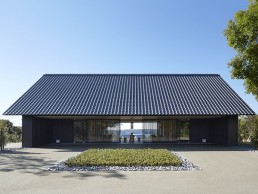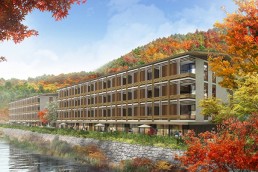Amanemu launches in Japan
Amanemu – a hot spring resort located in the Ise Shima National Park on the shores of Ago Bay – is set to launch on 1 March 2016.
Providing the perfect rural complement to Aman Tokyo, and continuing Aman’s journey within Japan, Amanemu adopts a classic Japanese aesthetic in the ryokan tradition with each of the 24 suites and four two-bedroom villas featuring their own onsen.
Designed by the same team behind Aman Tokyo, Kerry Hill Architects, the architecture of the resort is based on a contemporary interpretation of Japanese Minka buildings. Traditional low-slung tiled roofs and dark-stained Japanese cedar exterior walls are reflective of the simple nature influenced design of ryokans, Japan’s traditional bathing retreats.
The warm interior spaces offer elegant simplicity and have been carefully crafted in light shades of Japanese timber. Each stand-alone suite encompasses floor to ceiling windows with woven textile and timber sliding shutters, stretching from one end of the suite to the other, allowing for unobstructed views of the national park surrounding the resort. Custom-made furniture ensures a harmony between architecture and design, and incorporates white oak coffee tables, sofas and armchairs with neutral fabric tones.
Bathrooms follow the design of traditional Japanese baths, with charcoal-coloured basalt stone tiles, drawing the eye across the room to the private onsen with floor-to-ceiling windows. Again, in keeping with Japanese interior design, accessories are kept to a minimum so as not to distract from the view and the experience of taking a traditional Japanese bath, a unique cultural ritual.
Located between the restaurant and bar, sunken terraces constructed with basalt stone feature glass covered fireplaces, whilst a 33m freshwater infinity pool provides panoramic views over Ago Bay.
The resort is accented with traditional Japanese art, namely intricate Kumiko artwork developed in Japan in the Asuka Era (600-700 AD) and passed down through generations of craftspeople. It is created using a delicate technique of assembling small wooden segments together using a chisel to form a larger piece without the use of nails or glue. In addition, the spa and two-bedroom villas feature unique pieces of artwork by Japanese Kimono and Obi artisan, Genbei Yamaguchi, who hails from a family at the helm of obi making for over 270 years in Kyoto. Genbei’s intricately designed obi, the broad sash worn around the waist of a kimono, decorate the walls as an ode to an age-old Japanese tradition of displaying treasured family heirlooms.
At Amanemu, the holistic approach of the Aman Spa aims to promote wellbeing through the integration of treatments, relaxation, movement and nutrition. Heavily influenced by the abundance of natural hot springs and therapeutic powers of water, the 2000m² spa encompasses a large central onsen for communal bathing, plus two private spa pavilions each with their own indoor and outdoor onsen. There is also a state-of-the art fitness centre, Watsu suites and an expansive glass-walled yoga studio with an outdoor deck overlooking a peaceful garden, with a Tabunoki tree at its centre. The resort also features four additional treatment suites.
The restaurant, with its vaulted and coffered ceiling, gives a sense of space and draws on the authentic Japanese ‘izakaya’ style of informal sharing. The varied microclimate of Mie Prefecture, once hailed as the breadbasket of the ancient Imperial Court, provides Amanemu with an abundance of fresh local produce including delicate fruits, an array of vegetables, and spiny lobster and abalone from nearby waters. Matsusaka, one of the most acclaimed variety of Wagyu beef in Japan originates from the region and is renowned for its high fat-to-meat ratio with characteristic marbling pattern, is also served.
Based on the Japanese concept of ‘omakase’ where the chef selects dishes for his guests, a team of 12 chefs are responsible for creating the menu, which changes daily, based on the fresh produce available. In addition to the international wine list, a selection of sake, shochu and the finest vintage Japanese whiskey play an important role in complementing Amanemu’s culinary experience.
Japan’s most sacred Shinto Shrine, Ise Grand Shrine, also known simply as Jingū, is located just one hour from Amanemu, while Tokyo lies approximately 300km northeast of the resort and easily accessed via Japan’s high speed rail network. Nagoya is a scenic two-hour train journey or 25-minute helicopter ride from the resort.
Related Posts
4 December 2017
Hotel Indigo arrives in Japan
1 September 2016




